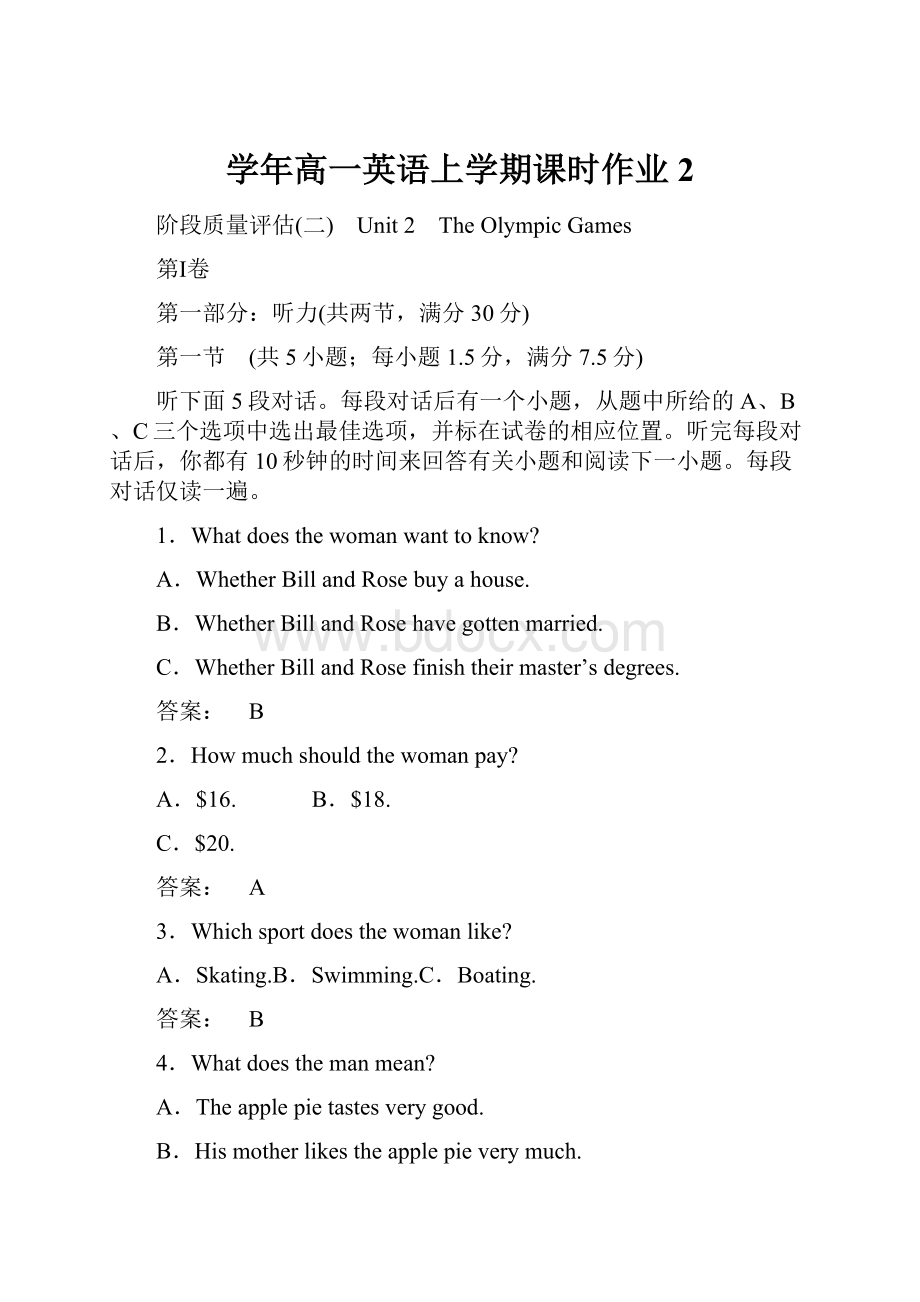学年高一英语上学期课时作业2.docx
《学年高一英语上学期课时作业2.docx》由会员分享,可在线阅读,更多相关《学年高一英语上学期课时作业2.docx(28页珍藏版)》请在冰豆网上搜索。

学年高一英语上学期课时作业2
阶段质量评估
(二) Unit2 TheOlympicGames
第Ⅰ卷
第一部分:
听力(共两节,满分30分)
第一节 (共5小题;每小题1.5分,满分7.5分)
听下面5段对话。
每段对话后有一个小题,从题中所给的A、B、C三个选项中选出最佳选项,并标在试卷的相应位置。
听完每段对话后,你都有10秒钟的时间来回答有关小题和阅读下一小题。
每段对话仅读一遍。
1.Whatdoesthewomanwanttoknow?
A.WhetherBillandRosebuyahouse.
B.WhetherBillandRosehavegottenmarried.
C.WhetherBillandRosefinishtheirmaster’sdegrees.
答案:
B
2.Howmuchshouldthewomanpay?
A.$16. B.$18.
C.$20.
答案:
A
3.Whichsportdoesthewomanlike?
A.Skating.B.Swimming.C.Boating.
答案:
B
4.Whatdoesthemanmean?
A.Theapplepietastesverygood.
B.Hismotherlikestheapplepieverymuch.
C.Theapplepiecan’tmatchhismother’s.
答案:
A
5.WhatcanwelearnaboutTom?
A.Hewillonlymeetthewoman.
B.Herememberedtophonetheman.
C.Heiscomingtothedinner.
答案:
C
第二节(共15小题;每小题1.5分,满分22.5分)
听下面5段对话或独白。
每段对话或独白后有几个小题,从题中所给的A、B、C三个选项中选出最佳选项,并标在试卷的相应位置。
听每段对话或独白前,你将有时间阅读各个小题,每小题5秒钟;听完后,各小题将给出5秒钟的作答时间。
每段对话或独白读两遍。
听第6段对话,回答第6至8题。
6.Wherearethespeakers?
A.Inacar. B.Intheopenair.
C.Atahotel.
答案:
B
7.Whendoestheconversationtakeplace?
A.Atnight. B.Intheafternoon.
C.Inthemorning.
答案:
A
8.Whydothespeakersdecidetogohome?
A.Theyfeelabithungry.
B.Thereistoomuchnoise.
C.Itisverylate.
答案:
C
听第7段对话,回答第9至11题。
9.WhatdidMikedolastnight?
A.Hewenttothepolicestation.
B.Hedroveintoadrugstoreandbrokeitup.
C.Hewentshoppingwithhisgirlfriend.
答案:
B
10.WhodidMikehaveaquarrelwith?
A.Astorekeeper. B.Apoliceman.
C.Hisgirlfriend.
答案:
C
11.WhereisMikenow?
A.Inastore. B.Atthepolicestation.
C.Athome.
答案:
B
听第8段对话,回答第12至14题。
12.Wheredidthemanfindhisschoolbag?
A.Underatree. B.Inthelanguagelab.
C.Inthelibrary.
答案:
A
13.Whatisthepriceoftheschoolbag?
A.$59.60.B.$69.15.
C.$69.50.
答案:
C
14.Howlongwillthewomanhavetowaittolistentothenextweatherreport?
A.30minutes.B.20minutes.C.10minutes.
答案:
B
听第9段对话,回答第15至17题。
15.Howdidthemanspendthissummer?
A.HewenttoChina.
B.Heworkedtosavesomemoney.
C.HestudiedChineseinasummerschool.
答案:
C
16.WhereisJennygoingnextsummer?
A.China.B.Egypt.
C.Japan.
答案:
B
17.What’stherelationshipbetweenthespeakers?
A.Goodfriends. B.Teacherandstudent.
C.Motherandson.
答案:
A
听第10段独白,回答第18至20题。
18.Whatdoesthespeakerthinkaboutmostgoodjobs?
A.Theycanmakeapersonrelaxandearnalotofmoney.
B.Theyareusuallythemostdifficult.
C.Theyareinteresting.
答案:
B
19.Howmanyyearsdodoctorsstudyforatleastaftergraduation?
A.6years. B.7years.
C.8years.
答案:
A
20.Whoareluckyaccordingtothespeaker?
A.Doctors. B.Athletes.
C.Writers.
答案:
C
听力材料
第一节 听下面5段对话。
每段对话后有一个小题,从题中所给的A、B、C三个选项中选出最佳选项,并标在试卷的相应位置。
听完每段对话后,你都有10秒钟的时间来回答有关小题和阅读下一个小题。
每段对话仅读一遍。
(Text1)
W:
HaveBillandRosegottenmarried?
M:
Billtoldmethattheyareputtingoffgettingmarrieduntiltheyfinishtheirmaster’sdegrees.
(Text2)
W:
Couldyoutellmethepriceoftheskirt?
M:
10dollarseach.Butyoucansave4dollarsifyoubuytwo.
W:
Givemetwo,please.
(Text3)
M:
Boatingandswimmingaremyfavoritesports.
W:
Ilikeswimmingbutnotboatingorskating.
(Text4)
W:
Whatdoyouthinkoftheapplepie?
Imadeitmyself.
M:
Verydeliciousindeed.Evenmymother’scan’tmatchthis.
(Text5)
W:
YoudidremembertophoneTom,didn’tyou?
M:
Well,yes,Iphonedhimandhe’scomingtothedinner.
W:
Andyoutoldhimheisn’tsupposedtomeetushere,Ihope.
M:
Youdidn’tsayanythingaboutthat!
第二节 听下面5段对话或独白。
每段对话或独白后有几个小题,从题中所给的A、B、C三个选项中选出最佳选项,并标在试卷的相应位置。
听每段对话或独白前,你将有时间阅读各个小题,每小题5秒钟;听完后,各小题将给出5秒钟的作答时间。
每段对话或独白读两遍。
听第6段对话,回答第6至8题。
(Text6)
W:
Howlovelyitistosithereintheopenairandseethemillionsofstarsinthesky!
M:
Itis!
Thewindisblowingsoftly.Andeverythingisniceandquietaroundus.
W:
It’sreallyapitywecan’tseethemoon.
M:
Seethemoon?
Howcouldyouseethemoonatthistimeofthemonth?
W:
Oh,yeah.That’sright.Hey,Ifeelalittlecoldnow.
M:
Let’sgetintothecarsothatwewon’tbesocold.
W:
Ithinkwe’dbettergohomenow.It’sverylate.
M:
OK!
Let’sgo.
听第7段对话,回答第9至11题。
(Text7)
M:
HaveyouheardwhatMikedidlastnight?
W:
No.Whathappened?
M:
Iguesshewasalittledrunkandhehadaquarrelinthecarwithhisgirlfriend.Well,hegotsomadatherthathedrovehiscarstraightintothefrontofthedrugstore.
W:
Whatdoyoumean?
M:
Imeanhedroveinside.Thefrontofthestorewastotallybrokenup.ActuallyIsawthecarjustnowasIpassedby.It’sstillparkedinthestorenexttothemilk.There’ssomefoodalloverthecar.It’sreallyterrible.
W:
I’mafraidMikeisintrouble.Whereishenow?
M:
Ihearheisatthepolicestation.It’sluckynoonewashurt.
听第8段对话,回答第12至14题。
(Text8)
W:
Wheredidyousayyoufoundyourschoolbag?
M:
Itwaslyingunderatreebetweenthelanguagelabandthelibrarybuilding.
W:
Howdoyouliketheschoolbag?
M:
It’sstrongandwonderfullydesigned.
W:
Howmuchwasit?
M:
69dollarsand50cents.
W:
I’mgoingtobuyonetomorrow.Oh.It’s6:
30.Iknowthestationgivesthenewseveryhouronthehour,butIdon’tknowwhentheyannouncetheweather.
M:
Tenminutestoandtenminutesafterthehour.
W:
Isee.
听第9段对话,回答第15至17题。
(Text9)
W:
Hello,Bob.Howwasyoursummer?
YoustudiedChinesethissummer,didn’tyou?
M:
Yes,Jenny.Ijustfinishedmysummerschoolclass.
W:
Well,howwasthecourse?
Chineseisverydifficult,isn’tit?
M:
Itseemedthatwayatfirst.Butafterawhile,itbecameeasier.
W:
Iguessyoudidverywell,didn’tyou?
M:
Well,Ididn’tgetanA.ButIdon’tthinkI’llhavetroubleinunderstandingeverydayChinese.
W:
YoumeanyouaregoingtoChina?
M:
Right.Butnotthissummer.Howaboutyou?
(Youaregoingtotravel,aren’tyou?
)
W:
I’dloveto,butIhavetoworktosavesomemoneyfirst.I’mgoingtoEgyptnextsummer.
M:
Iguesswe’llhavealottotalkaboutnextsummer,won’twe?
W:
Ithinkso.
听第10段独白,回答第18至20题。
(Text10)
Asweallknow,mostpeopleinsocietymusthaveajobtomakealiving.Theygotoworknearlyeverydaybuttheyarenotsatisfiedwiththeirjobs.Theyoftenwanttofindbetterjobs.Whatisagoodjob?
Theythinkagoodjobisinterestingandcanmakeapersonrelaxandearnalotofmoney.Buttheydon’tknowthatalmostallofthegoodjobsareusuallythemostdifficult.Itisnotonlyhardtofindthem,butpeoplemustalsotakealongtimetolearnhowtodothem.Doctorsstudyforatleastsixyearsaftergraduation.Pilotsstudyevenlonger.Theyhavetolearntoflysmallaircraftandtheymustbeatleast30yearsold.Manysuccessfulathletesareyoung.Footballandtennisstarsareusuallyunder35.Olderpeoplecan’tmovefastenoughandcanonlybecoaches.Mostpeopleworkuntiltheyare60or65yearsoldbeforetheyretire.Somepeoplehavealotofsparetime.Thesepeopleusuallyhaveinterestingjobs;forexample,theyarewriters,artists,musicians,oractors.Theirworkistheirlives.Theyarealllucky.
第二部分:
阅读理解(共两节,满分40分)
第一节 (共15小题;每小题2分,满分30分)
阅读下列短文,从各题所给的4个选项(A、B、C、D)中选出最佳选项。
A
Asearlyas1894,thenewly�formedInternationalOlympicCommittee(IOC)considerediceskatingasapossibilityforthefirstmodernOlympicGameswhichwouldbeheldin1896.
In1911,amemberoftheIOCsuggestedthatwintersportsshouldbestagedaspartofthe1912OlympicsinHelsinki.Someopposedtheidea.Atlast,theIOCdecidedtoholdWinterOlympicGamesin1916.However,WorldWarⅠbrokeoutin1914.After1920,thenationalgoverningbodiesforwintersportsinseveralcountriesbegantalkingaboutthepossibilityofaseparateWinterOlympics.
ThetownofChamonix,intheFrenchAlps,plannedtoholdawintersportsfestivalin1924,atthesametimePariswastohosttheOlympics.TheMarquisdePolignac,amemberoftheIOC,suggestedthatthefestivalbeformallyrecognizedastheWinterOlympicGames.TheIOCdidn’tgothatfar,butdidagreethatChamonixcouldcallitsfestivalan“Olympicwintercarnival”.
Thefestivaldrew258athletesfrom16countriestocompeteinbobsledding(雪橇车比赛),figureskating,hockey,Nordicskiingandspeedskating.CharlesJewtrawfromtheUnitedStateswonthefirstgoldmedal,inthe500�meterspeedskating,butthefestival’sherowasClausThunbergfromFinland.Hewonfivemedals,threeofwhichweregold,inspeedskating.
WeatherhasoftenbeenamajorstoryattheWinterOlympics,andsoitwasatChamonix.Thefestivalopenedwithrainandunseasonablywarmtemperaturethatturnedsnowandicetomud.Thentemperaturedroppedasfaras25belowzeroandthemudbecameice.
Despitetheweather,morethan10,000peopleshowedup.Atitsyearlymeetingin1925,theIOCrecognizedtheChamonixfestivalasthefirstWinterOlympicsanddecidedthattheWinterGameswouldbeheldeveryfouryears,justliketheSummerOlympics.
语篇解读 本文简单介绍了冬季奥运会的由来。
21.WhywasthefirstWinterOlympicGamesnotheldin1916?
A.BecausetheIOCdidn’tagreetoit.
B.Becauseitwasstillunderdiscussion.
C.Becausesomepeopleopposedtheidea.
D.BecauseWorldWarⅠbrokeoutin1914.
解析:
细节理解题。
根据第二段中的“However,WorldWarⅠbrokeoutin1914.”可知是第一次世界大战打断了冬奥会的进程。
答案:
D
22.HowmanyyearsearlierwasthefirstmodernOlympicGamesheldthanthefirstWinterOlympicGames?
A.16. B.24.
C.28.D.29.
解析:
推理判断题。
根据第一段的“forthefirstmodernOlympicGameswhichwouldbeheldin1896”可知第一届现代奥运会是1896年召开;根据第三段和最后一段可知第一届冬奥会是1924年召开,通过计算可知C正确。
答案:
C
23.Wecanknowfromthepassagethat________.
A.theweatherdestroyedthefirstWinterOlympics
B.peoplefrom16countrieswatchedthefirstWinterOlympics
C.CharlesJewtrawwonthemostmedalsinthefirstWinterOlympics
D.Finlandgotatleast3goldmedalsinspeedskatinginthefirstWinterOlympics
解析:
推理判断题。
根据第四段的“ClausThunbergfromFinland.Hewonfivemedals,threeofwhichweregold,inspeed